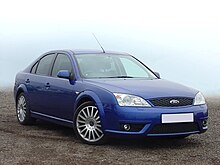Essex man
Essex man (also known as Mondeo Man) is a stereotypical figure which was popularised in 1990s England. "Essex man" as a political figure is an example of a type of median voter and was used to help explain the electoral successes of Margaret Thatcher in the previous decade. A consumer of luxury goods and products, "Essex man" and his tastes are often parodied. He may be considered a somewhat coarser and more down-market version of the American "yuppie."
Background
Although the Labour Party is sometimes considered the "natural choice" for the working class, there has traditionally been a group within that class who have voted Conservative,[1] who are distinct from the "Essex man" phenomenon.
After World War II, there was considerable social change in south-east England. Working class families were encouraged to leave the war-damaged slums in inner London and move to newly-built council-owned properties in the suburbs and "new towns" in the home counties, including Basildon and Harlow in Essex.
With the decline of manufacture and skilled manual work in the 1980s, this group increasingly looked to middle class professions for employment or became self-employed. Their children enjoyed housing, education and employment opportunities far removed from the experiences of their parents.[2]
Thatcherism
Margaret Thatcher's policies from 1979 to 1990 included lower taxation, control of inflation and sale of council housing stock at subsidised prices. These policies (in particular, the right to buy scheme) are thought to have caused many people who had traditionally voted Labour to switch their allegiance in the 1979, 1983 and 1987 elections.[3]
Owing to the similarities between the politics of Thatcher's Britain and Ronald Reagan's America, the contemporary term "Reagan Democrat" is roughly analogous to "Essex man".
In culture

The Oxford English Dictionary (OED) lists the earliest reference to the Essex man as one from 7 October 1990 in the (conservative) Sunday Telegraph, although this unmistakable reference is found months earlier in the 26 January 1990 issue of Campaign: "Representative [David Amess] of new Essex man, working-class, father electrician, right-wing, keen hanger, noisily rambunctious, no subtlety".[4] Portraits of Essex man include Harry Enfield's Loadsamoney; alternative names include Mondeo man (based on company car ownership).[3]
